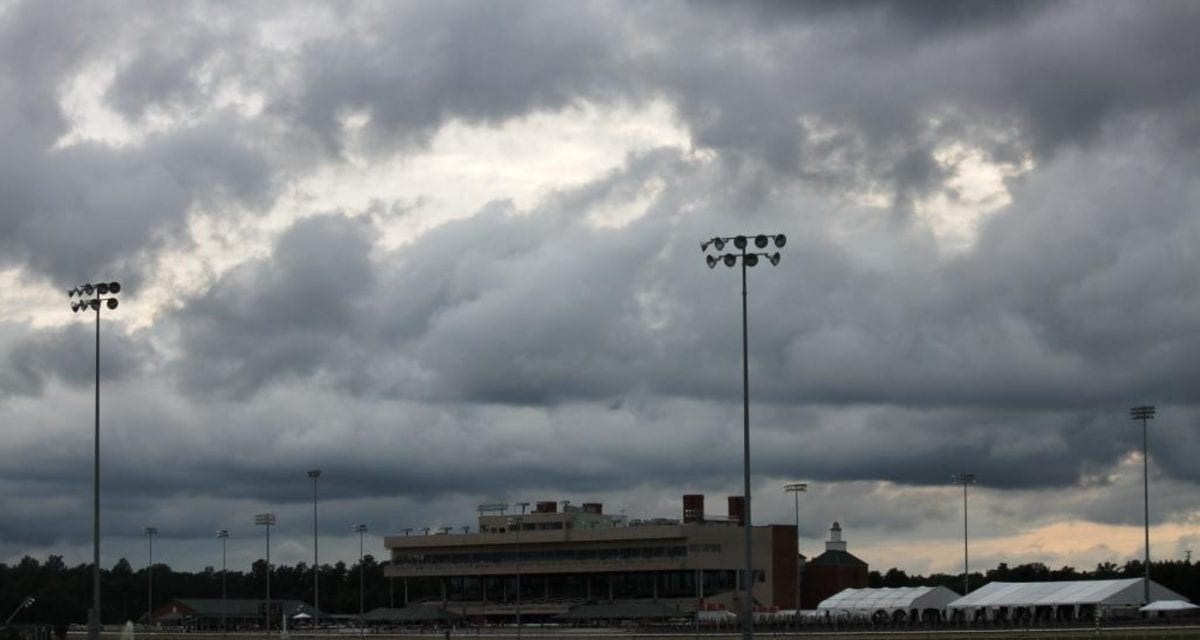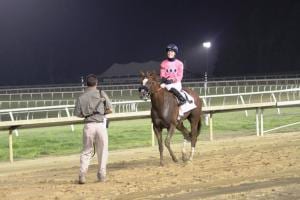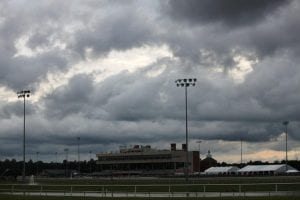by Nick Hahn
If you’ve been on vacation for a month or so, not much has changed in the racing impasse that has stymied live Thoroughbred racing in Virginia. Colonial Downs has appealed the Virginia Racing Commission ruling to race 25 days in 2014, and, well, not much else has occurred
After setting and canceling numerous meetings throughout the summer, the Virginia Racing Commission looks to reconvene on September 17th in a new location. Next Wednesday in the Patrick Henry Building in the downtown Richmond is where racing officials will meet to address the Commission’s standing order that Colonial hold 25 days of live racing this year.
As a result of the lockdown, Colonial’s state-bred racing event — formerly known as the Commonwealth Turf Festival — will be run in the Free State at Laurel Park. With no other suitable venue in Virginia, the Maryland Jockey Club has agreed to host with purse money provided by the Virginia Breeders Fund, the handle collected (and retained) by the Maryland Jockey Club.
The Maryland Jockey Club will be good hosts of the event; since Colonial’s grand opening, many of Maryland’s racing personnel have come to work Virginia’s summer meet. This time they won’t have to commute. Virginia racing comes north.
Clearly, Virginia horsemen wanted to make a statement about this opportunity especially at the entry box. The Jamestown Stakes will be run in two divisions, up 10 entries from 2013. This year’s edition of the Punch Line more than doubled its participants from 6 to 13. The Oakley, Brookmeade and Bert Allen are also up an interest or two.
With many of Virginia’s outfits located closer to Laurel than New Kent, these races appear healthier when run in Maryland. It wouldn’t be the first time restricted races have been held across state lines, and even the Preakness, Maryland’s signature event, was run in New York for nearly two decades.
Perhaps it is appropriate that these races are held out of state, as Virginia’s racing product — on the farm or on the track — does appear to generate interest everywhere, except in Virginia. Whether through convenience of location — Laurel is closer to most beaten paths than Colonial — or political spite, tomorrow’s Virginia-bred races should produce some compelling races, in addition to gold-star participation awards.
As a two-year-old race, the Jamestown benefits by being run later in the year and has attracted enough first-time starters to be run in two divisions led Wesley Ward’s Hooligan in the Jamestown, Part I and Jonathan Sheppard’s Moon River in the Jamestown, Part II.
For the first time since their stretch duel on the Colonial turf, last year’s Oakley winner Lion Down by Me and Heaven Knows What are set for a rematch.
Boltin’ Out looks to become the first repeat winner of the Punch Line since Bop. But he’ll have to contend with Jake Rattle N Roll, making his sixth Punch Line appearance; Jake has finished second the last three years and won the turf sprint in 2009.
Rose Brier and Hard Enough look to foil Dannhauser’s repeat bid to win the Bert Allen Stakes.
These are good races that attracted the Interests of Virginia horsemen, who annually race out of state 40-something weeks of the year, and are anchored by a generation that knows Virginia without a racetrack very well.
“It makes no sense to export a native industry,” then-Governor Mark Warner was quoted a decade ago in support of a legislative package that expanded off-track wagering.
But that is exactly what has happened.
Not only has Virginia racing lost its races, but it has also lost its brand. Once among the leading breeding states, Virginia now finds even its native sons are not actually native. Tonalist, General A Rod and Wicked Strong are all stars among this year’s three-year old crop that spent a significant portion of their early years in Virginia — but race under the Kentucky-bred label.
With the right packaging, this might have been recognized as a banner year for Virginia racing interests. Colonial Downs would have run in the coolest summer in decades. Virginia horsewoman Maggie Bryant captured the Travers with V.E. Day. Bryant is also a part-owner of Jim Dandy winner Wicked Strong, who was raised at Centennial Farm in Middleburg. Tonalist, bred by Rene and Lauren Wolcott’s Woodslane Farm in the Plains, won the Belmont Stakes. Last month’s Arlington Million winner, Hardest Core, that Virginian Rusty Carrier and Greg Bentley bought for Bentley’s son, Andrew, is a remarkable story. So Lonesome, owned by Ed and Pat Schuler, a mom-and-pop outfit located just east of Charlottesville, won the Albany Stakes at Saratoga.
So this is how the year without Virginia racing moves forward. Colonial lacks any meaningful long-term vision and doesn’t want to invest in Virginia’s racing future. Colonial’s absentee owner, Jeff Jacobs, rarely appears at Virginia Racing Commission meetings, and his only public input is via an occasional comment made by press release when serving a tactical need. His bake-sale attempt to show a need for alternative gaming isn’t disguised well, and in the year when the World Cup was staged, is horse racing’s equivalent of a flop.
So in the riddle that is Virginia racing at Colonial Downs, where’s the punchline? Right now, at Laurel.











All of this thanks to the fools at Jacobs Entertainment, the cretins who own Colonial Downs and who would rather run no races than any races. The back of my hand to the putty you call a face, Mr. Jacobs.